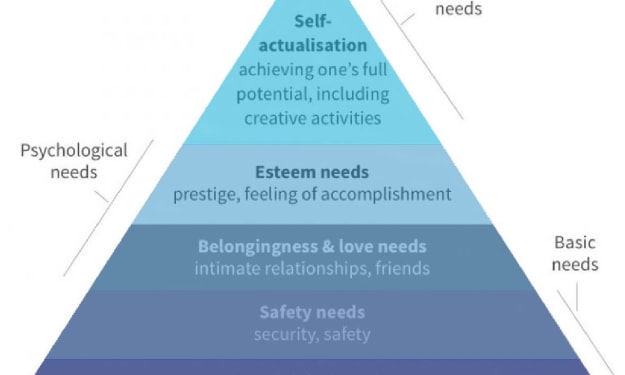Uncertainty-Reducing Behavior: What It Is and How to Deal with It the “Right” Way
Seeing reality from a different perspective

Uncertainty-reducing behavior is omnipresent, yet not many people exhibit the “right” kind of behavior.
I want to propose a very basic, simple, and unifying way of looking at behavior and psychology.
Simply said, every behavior we show either increases or reduces uncertainty. Or if you prefer the other way around: reduces or increases certainty.
First of all, what can we regard as “uncertainty”?
What is “uncertainty”?
Uncertainty can be explained in many ways, but I prefer these two definitions:
- Uncertainty means an increase of local entropy
- Uncertainty means getting further away from your goal, or at least, experience that feeling
For practicability and simplicity issues, we will go for the second definition.
Uncertainty can be caused and experienced both in the long-term and short-term. We will first discuss short-term uncertainty as well as its differences with long-term uncertainty.
Defining short-term uncertainty: irrational
Short-term uncertainty is usually caused by something highly emotional e.g. anger or anxiety. So why do we call this “short-term”? Because it can change rapidly. Our emotions and feelings are not rational, it is very well possible to experience the same situation, have the same life goals, yet produce different emotions and feelings.
As emotions become high, the neural activity decreases in the neocortex, a brain region responsible for higher-order thinking and long-term planning. The more primitive brain regions, on the other hand, don’t really “care” that much about the future. All it cares about is surviving in the present, hence short-term uncertainty.
Short-term, unlike long-term uncertainty, is less dependable on the rational goals you have set.
Defining long-term uncertainty: rational
Long-term uncertainty is a lot more dependent on the life goals you have put up. Again, our definition of uncertainty is “getting further away from your goal”.
Things like being rejected from a job application could belong to long-term uncertainty. Or a famous example: an existential crisis.
Uncertainty-reducing behavior: short-term and irrational
As the name suggests, uncertainty-reducing behavior is behavior with the aim of reducing uncertainty, which can be both in the short-term and long-term.
When thinking of uncertainty-reducing behavior, you should think and imagine it as simple as possible. Why? Because it’s really omnipresent. Let’s review some examples showing its simplicity.
Being angry is an example of uncertainty-reducing behavior. Or how about your dog barking? Same thing with putting makeup on your face.
Remember, things can be both rational and irrational, so even if being angry actually does increase uncertainty (rather than reducing it), such behavior is simply programmed in us, together with nurture of course.
Another characteristic of short-term uncertainty-reducing behavior is that its aim is to reduce uncertainty in the short-term, not long-term.
This means that being angry may give you (subconsciously) a feeling that uncertainty is being reduced, for the time being, but, again, your more primitive brain regions don’t care that much about the future i.e. long-term. In other words, your anger might have caused a feeling of control in the short-term but ruined a relationship with someone in the long-term.
Uncertainty-reducing behavior: long-term and rational
Again, we should think as simple as possible. Examples of long-term uncertainty-reducing behavior are saving money for the future, learning new stuff, building your network, friendships, etc.
This type, then, is much more dependent on the life goals you have put up.
Now, you might say that some people are putting up long-term goals that are far from rational, goals that are detrimental to themselves and/or humanity. I, however, like to define “rational” with the following quote:
“The pendulum of the mind alternates between sense and nonsense, not between right and wrong.” — Carl Jung
We can easily imagine how certain uncertainty-reducing behaviors do make “sense”, but aren’t exactly “right”. How can we, then, develop more “right” ways of uncertainty-reducing behaviors both in the short-term and long-term?
Dealing with short-term uncertainty the “right” way
First of all, what can we consider as “dealing with short-term uncertainty the wrong way?” Although subjective, I believe becoming angry, disrespecting the other, manipulating the other, etc. can be considered wrong.
Again, short-term uncertainty is usually caused by a decrease of activity in the neocortex, because of heightened emotions. This reduces higher-order thinking and long-term planning.
The most straightforward way to deal with short-term uncertainty, then, is to remain as calm as possible. How can one achieve that? By distracting yourself from whatever causes heightened emotions.
In mindfulness, you learn that you can achieve that by focusing on your breath. The best way to deal with it righteously is by removing yourself from the person or environment for a while. This has to do with the fact that you aren’t as much in control as you like to believe, see:
Why Willpower Doesn’t Work: And what to do about it
Dealing with long-term uncertainty the “right” way
So this one is a lot more complicated of course because it depends on your life goals and your philosophy behind them.
The first most obvious thing to deal with long-term uncertainty the right way is to not turn it into a short-term uncertainty i.e. showing heightened emotions, which reduces high-order thinking, and so on.
Second, we should try to define what we mean by “dealing with long-term uncertainty the wrong way”. I guess one way to deal with it that is wrong, is when you try to do things that are detrimental to others.
Of course, you should be egotistical from time to time, but only to a certain extent. Maybe the following quote makes that concept more clear:
“Some people care about others because they care about themselves. Others care about themselves because they care about others.”
Essentially, you are being egotistical in the short-term, in order to give more to others in the long-term. Here we have found another way to deal with long-term uncertainty the wrong way: Sacrificing the future for a better present.
The right way, then, is the opposite: Sacrificing the present for a better future.
Another way to deal with it the right way is by ensuring that you satisfy the lower hierarchies of the pyramid of Maslow well enough, while simultaneously ensuring that you keep your focus on the higher hierarchies i.e. self-actualization. I have designed a special article for this concept:
In short, the higher your focus is placed (e.g. self-actualization), the more long-term your goal probably is.
Practice questions
- Look around you, yourself, other people, your dog or cat. What behavior do they show that could constitute “uncertainty-reducing behavior” and what causes that heightened uncertainty?
- How do you deal with both short-term and long-term uncertainty? Can you find ways that are more effective and “right”?
- What uncertainty-reducing behavior are you or anyone else showing that you consider “wrong”?






Comments
There are no comments for this story
Be the first to respond and start the conversation.